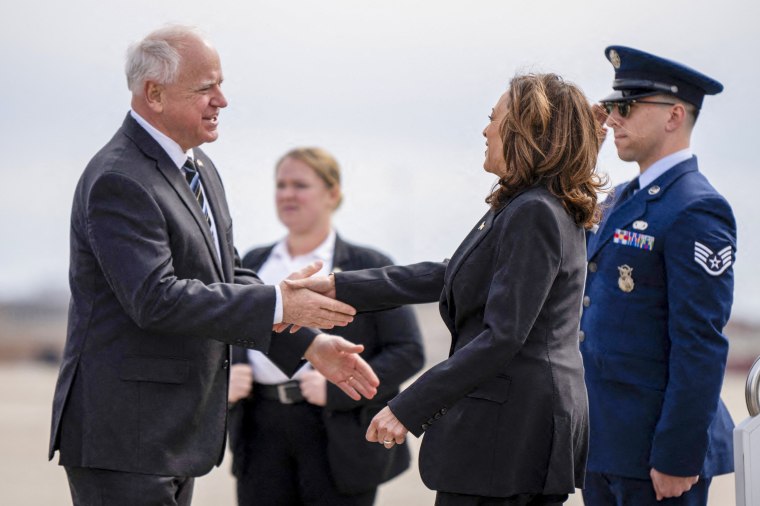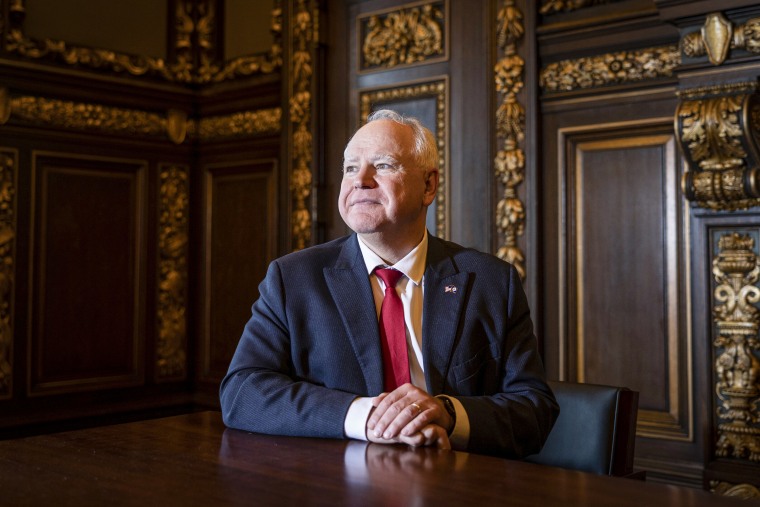
The two-term governor and former House member has gained notice for folksy rebukes of Trump and support for progressive policies in his state.
Get more news Live Aug. 6, 2024, 1:13 PM UTC / Updated Aug. 6, 2024, 3:50 PM UTC By Adam Edelman , Monica Alba , Peter Alexander , Yamiche Alcindor and Gabe GutierrezVice President Kamala Harris has selected Minnesota Gov. Tim Walz as her vice presidential running mate, adding a popular Midwestern state executive to the Democratic ticket as the party gears up to hold onto key northern battleground states this fall.
Harris' campaign texted supporters Tuesday morning, calling Walz "a battle-tested leader who has an incredible track record of getting things done for Minnesota families" and asking for donations to support the new ticket.
In picking Walz, who's in his second term and also served 12 years in Congress, Harris will have as her No. 2 someone with a proven record of winning over white working-class voters in Rust Belt states while also boasting a robustly progressive record.
Democrats will hope that mix of attributes helps a Harris-Walz ticket shore up support in the onetime “blue wall” states of Wisconsin, Pennsylvania and Michigan — longtime Democratic strongholds at the presidential level that Donald Trump flipped in 2016 and Joe Biden flipped back in 2020. This year, they’ve been seen as Biden’s, and now Harris’, most viable path to victory.
Walz, 60, had initially been viewed as a long shot in a field of vice presidential contenders. That list included rising party stars, some of whom have been mentioned as future presidential candidates, including Pennsylvania Gov. Josh Shapiro, who praised Walz in a statement and said he's "fully committed to electing the Harris-Walz ticket."

Now Harris has chosen a governing partner who has leaned in at times to a folksy, Midwestern reputation while also proving to be a reliable attack dog against Trump.
Walz's experiences earlier in his life, as a public school teacher and a member of the Army National Guard, could also buttress his ability to speak to different voting blocs — including veterans and organized labor — that Harris will need to win in November.
Ultimately, Harris had very strong chemistry with Walz when they met Sunday at her residence, according to four sources familiar with the selection process, playing a key role in her decision because it was clearer with him than with the other top contenders. Harris also appreciates how different Walz is from her in terms of the contrast he can provide, the sources said.
A fifth source close to the process put it this way: "Is this someone who you would want to have lunch with every week for four years?"
Walz learned that he was the pick Tuesday morning at home with his wife, children, sister and brother-in-law, according to a source familiar with the gathering.
Now, Walz starts the campaign broadly unknown nationally: A new NPR/PBS/Marist poll released Tuesday showed 71% of Americans saying they didn't have an opinion about Walz or had never heard of him. Another 17% viewed him favorably, while 12% viewed him unfavorably. Both campaigns will now race to define him.
Walz, a Nebraska native, enlisted in the National Guard when he was 17 and served for more than two decades, with both domestic and overseas deployments. He later was a high school social studies teacher and football coach in Mankato, about 80 miles south of Minneapolis, before he won a congressional seat in a largely rural and agricultural district in 2006.
He represented Minnesota’s 1st District for 12 years before his successful run for governor in 2018. A 1995 reckless driving arrest in Nebraska, during which, an officer said, Walz failed a sobriety test, came up in his campaigns for House and the governorship, but he was elected anyway. Walz called it a “gut check moment” in an interview with the Minneapolis Star Tribune in 2018, saying he stopped drinking afterward.
Walz's allies have spoken frequently about how his background representing rural communities is much needed in the party, noting that he won re-election in a red-trending district — one that was about evenly divided in 2012 but swung heavily to Trump in 2016 — and could help Democrats compete for some moderate or conservative voters skeptical of Trump this time around.
Walz also had the most Capitol Hill experience of anyone on Harris' reported short list, with relationships in Congress that could help a new president move a legislative agenda.
As governor, Walz has overseen a bonanza of progressive policy accomplishments — particularly during his second term, during which Democrats have also controlled both chambers of the Legislature.
He has signed laws protecting abortion rights, legalizing recreational marijuana, restricting gun access and providing legal refuge to trans youths whose access to gender-affirming and other medical care has been restricted elsewhere. Progressives elsewhere have pointed to Minnesota as a case study in how to effectively use the power of a legislative trifecta to achieve policy priorities.
Walz also enacted laws expanding paid family leave, banning most noncompete agreements, providing universal school meals for students and capping the price of insulin in Minnesota (three years before Biden did it nationally) — a list of legislative wins his colleagues and supporters have said would translate nationally.

In recent days, Walz has turned up the publicity dial, trying out attack lines against Trump and Sen. JD Vance in a slew of media appearances.
In a late July interview on MSNBC’s “Morning Joe,” he ripped Trump and Vance as "weird," gaining wider notice. Harris herself began using the “weird” line almost immediately.
The pro-Trump super PAC MAGA Inc. immediately painted Walz as "incompetent" in a statement and called him and Harris "both far-left radicals that don't know how to govern." Karoline Leavitt, the Trump campaign press secretary, called Walz a "West Coast wannabe" who has tried "to reshape Minnesota in the image of the Golden State."
Walz used his pre-selection media appearances to attack the GOP ticket by playing up his strong cultural ties to the middle of the country — and to demonstrate to Democrats how he would campaign to win over those voters.
“What I know is that people like JD Vance know nothing about small town America,” Walz said on MSNBC’s “Morning Joe” on July 23. “My town had 400 people, 24 kids in my graduating class, 12 were cousins. And he gets it all wrong.”
“It’s not about hate. It’s not about collapsing in. The golden rule there is mind your own damn business,” Walz said, adding that Republican "policies are what destroyed rural America. They divided us. They’re in our exam rooms. They’re telling us what books to read.”
“And what I think what Kamala Harris knows is bringing people together around the shared values, strong public schools, strong labor unions that create the middle class, health care that’s affordable and accessible, those are the things,” Walz said.
Picking Walz doesn't come without risks. While his selection underscores Democrats' effort to aggressively go after Midwestern voters, he doesn't bring a specific battleground state advantage: Minnesota hasn’t gone red in a presidential race since 1972.
In addition, as Walz’s stock has risen in recent days, critics have reintroduced questions about his governing record. They include concerns over a delay calling in the National Guard as protests engulfed Minneapolis following the murder of George Floyd by city police officers in May 2020, as well as the fact that the biggest pandemic fraud case in the U.S. happened under his watch. MAGA Inc. hit on both items in its news release after news of the Walz pick broke.
Another presumed liability for Walz’s VP chances early on had been his role as a co-chair of the Democratic National Convention rules committee — a job that, in the chaotic days after Biden dropped out of the race, led him to help Harris quickly become the party’s presumptive nominee.
Any potential criticism over a conflict of interest was largely rendered moot when precisely zero high-profile competitors challenged Harris for the nomination.
Walz told reporters that “anybody [who] wants to put their name in” to be nominated” can do so.